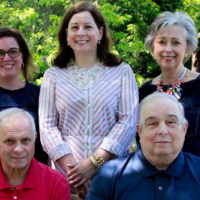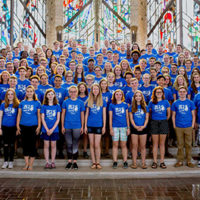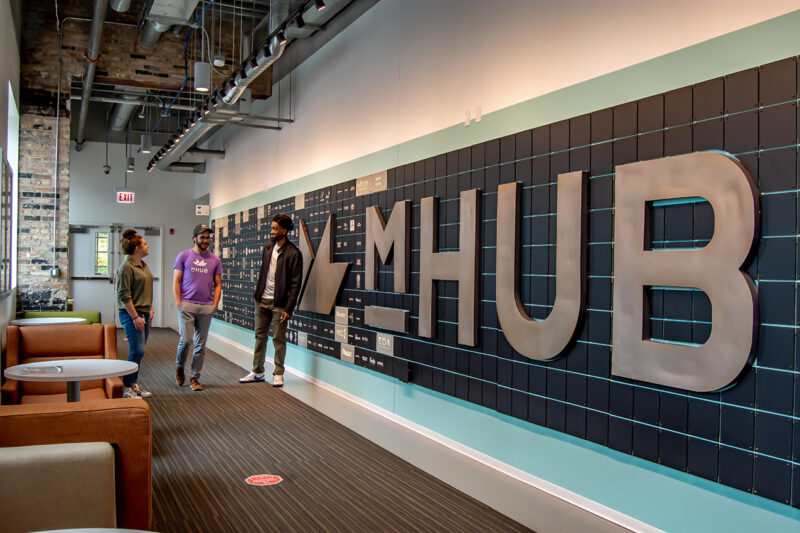Last year CFF made its first gift to an organization called mHUB. mHUB describes itself as an innovation center for all things hardtech. As an incubator for entrepreneurs with business ideas focused on manufactured products, the space provides all the usual business advice, access to capital and mentoring that one might expect, and in addition offers a shared micro-factory with high tech manufacturing equipment that can be rented by the hour for prototyping and small batch runs. mHUB has leaned into the inherent DNA of entrepreneurs who are bent towards collaboration and bringing great, new things to market. Beyond the traditional “tech incubator” model, mHUB created a gig economy to support outsourced R&D for manufacturers, raised a venture fund, and launched a traditional accelerator program.
Any visit to mHUB is exciting. It buzzes and whirls and hums with entrepreneurial energy, and you can look at a very realistic looking 3D printed donut (pink frosting, sprinkles). 60 percent of entrepreneurs and engineers in the space assisting with prototyping are men. Women and people of color are enough of a minority here, like in the larger tech and manufacturing space, that when I made my last site visit and walked into the shared office area to speak with members of the cohort of women entrepreneurs that CFF supported last year I saw women in the space broadly, but this group of 6 sitting together stood out.
With a seed grant from CFF, mHUB piloted their initial cohort designed to increase access to their space for members of underrepresented groups. While the commitment was to recruit 10-15 women, the hope was that the group would be diverse.
Shannon McGhee, who oversees this program, took it as an opportunity to test the full cohort model for marginalized founders underneath a greater initiative to drive equitable access to entrepreneurship. mHUB has dubbed this “pre-accelerator program” mPOWER, and while the CFF-supported pilot focused on women, mHUB has plans to scale the program to support Black Founders, LatinX founders, and other marginalized groups in tech.
Shannon and her team found 13 women, the majority of whom are women of color to participate in this first pilot cohort. When I had the chance to meet them I was impressed by the diversity of their product ideas, backgrounds and experiences. This is a fun group of entrepreneurs. Particularly striking was how important the cohort model was to them, and how far they had helped each other get as a group of peers. Some of them have been working on their product ideas for a very long time. Being part of this mPOWER Women Founders Pilot has helped them build new connections to networks, technical support, suppliers, and investors to take their ideas to business scale. Not to be discounted: entrepreneurship is incredibly isolating, and peer connections are one of the outcomes of this model. In a society where women and people of color are socialized in a way that holds them back, these programs are critical to building a safe space in a group of peers, without taking participants out of the growing and thriving ecosystem of Chicago tech.
mHUB is now fundraising for community regrants which allow them to support community-based organizations on the South and West sides, as a part of a broader 5-year effort called the Catalyze Initiative, to drive capacity in these organizations and collaborate on driving awareness and sourcing more idea-stage entrepreneurs. Those entrepreneurs can then receive stipends to participate in the mHUB community and bring their businesses into being faster. Having successful Black entrepreneurs building businesses to make products on the West Side of Chicago would give young people important models for a good life. It is easy to be nostalgic for the old days of US manufacturing and to wish that more people would develop product ideas that are useful and could be made here, and easy to wish that someone would partner in a serious way with more West Siders to bring that economic development into the community. The work of actually doing those things is quite difficult. mHUB has now dived in with a solid plan and encouraging first year results. CFF is delighted to provide a second year of support, and will follow this program with interest as it builds new West Side relationships.
To learn more about mHub or to support their work, please contact Shannon McGhee at shannon@mhubchicago.com.
—Contributed by Clare Butterfield, Executive Director


 About Us
About Us Programs
Programs